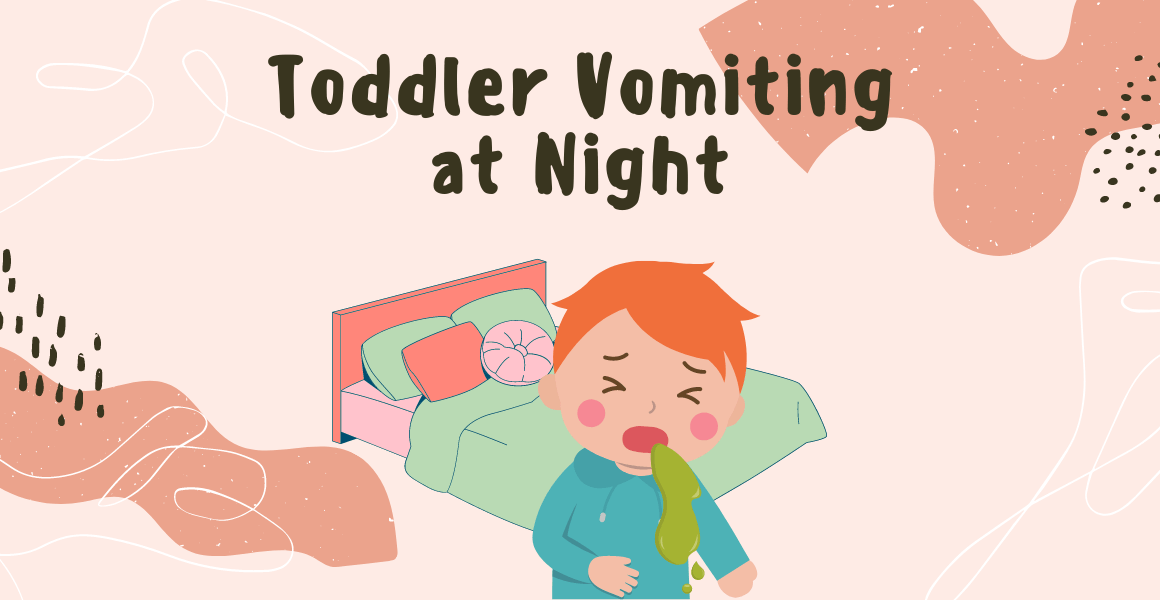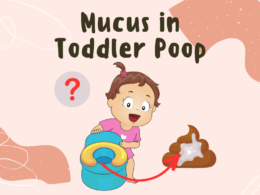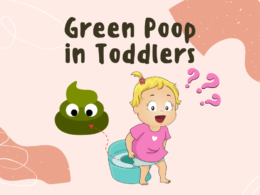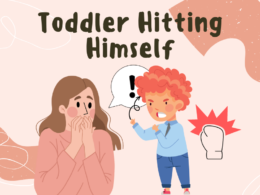Quick Summary
- Nighttime vomiting can lead to dehydration, so you’re right to worry ⚠️
- Causes of vomiting in toddlers include: infections, food allergies or intolerances, an intestinal blockage, and gastroesophageal reflux disease (GERD) 🦠
- You can rehydrate your child with clear fluids or electrolyte solution and give them antiemetics if necessary 💊
- If you think your child ate something poisonous, take them to a doctor 👨⚕️
- Severely dehydrated children may need IV fluids 💧
Causes of Toddlers Vomiting at Night
If your toddler has lost their appetite and started to vomit, you may want to read up on common causes below.
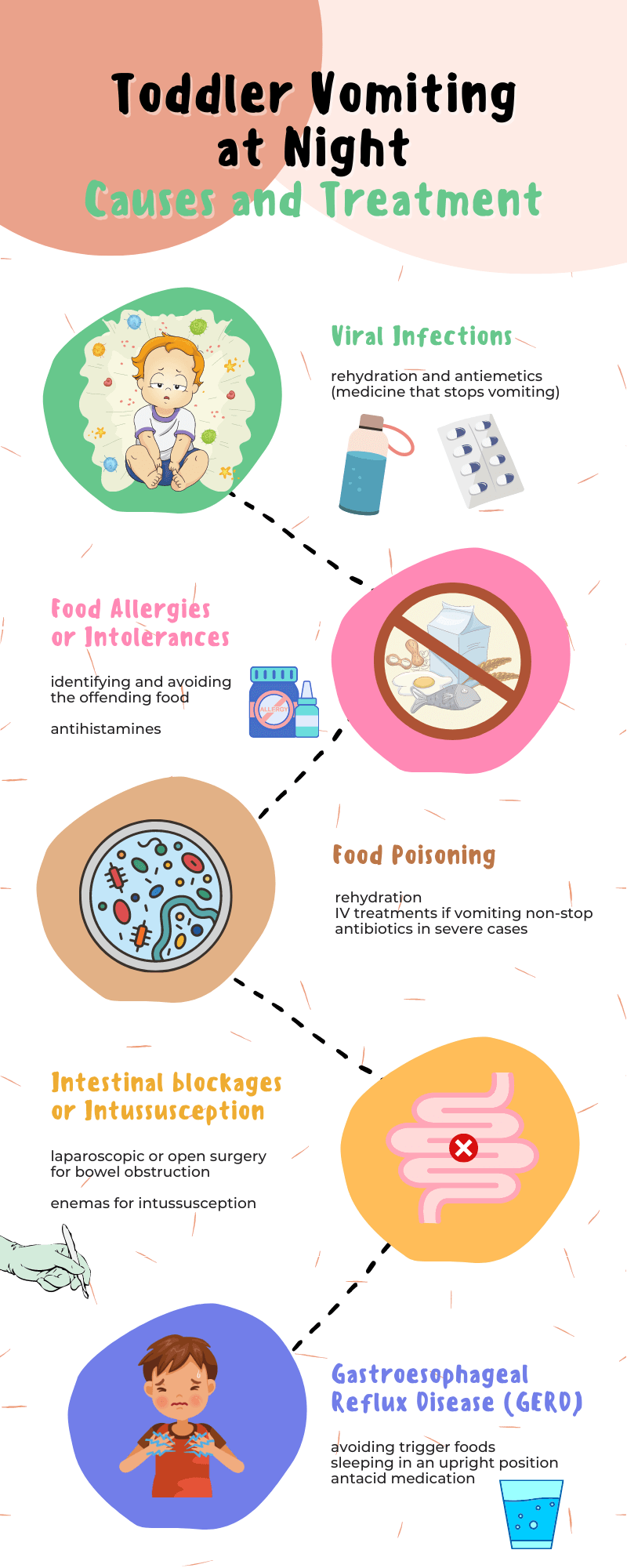
Infections
Your toddler vomiting at night may be caused by a bacterial or viral infection. For example, they may have:
- gastroenteritis (stomach flu);
- rotavirus;
- adenovirus;
- norovirus.
Ear infections, sinus infections, and even urinary tract infections may cause vomiting if the infection spreads to other areas of the body.
Food Allergies or Intolerances
Toddler vomiting at night after drinking milk may be due to an allergy or intolerance. If your child has a food allergy, they may vomit after eating even a small amount of the offending substance. If it’s an intolerance, they may feel unwell if they have a large amount of the food or if they eat it on an empty stomach.
Your toddler may also have a gastrointestinal disorder that causes vomiting at night, such as:
- celiac disease;
- inflammatory bowel disease;
- cyclic vomiting syndrome.
A doctor can help you rule out or confirm any of these conditions.
Intestinal Blockage
Toddlers are curious creatures who often put things in their mouths that they shouldn’t. If your toddler has been vomiting, it could be a sign of an intestinal blockage. This is a serious condition that occurs when a foreign object gets stuck in the intestines and prevents food from passing through. Intussusception is another problem, where part of the intestine slides into an adjacent part.
Signs of an intestinal blockage include:
- severe abdominal pain;
- bloating;
- nausea;
- vomiting.
If your toddler has any of these symptoms, seek medical attention. Intestinal blockages can lead to serious health complications if left untreated.
Gastroesophageal Reflux Disease (GERD)
GERD is a common disorder diagnosed in toddlers vomiting at night. It’s caused by a weak or immature sphincter muscle between the stomach and the esophagus. When this muscle doesn’t close properly, stomach acids can rise up into the esophagus, causing irritation and inflammation. In some cases, the acid may even reach the throat or mouth, leading to an unpleasant burning sensation.
GERD is often treated with lifestyle changes, such as avoiding trigger foods and sleeping in an upright position. Medications may also be prescribed to reduce stomach acids and help the sphincter muscle to function properly. With treatment, most children with GERD find relief.
Editor’s Note
Don’t be quick to imagine the worst scenarios. Nighttime vomiting is usually not a medical emergency, but even if it is, you need to remain calm and answer all the questions that doctors may ask you. Record important details so that you can recall them later and remember: following the advice of health professionals is key for ensuring a speedy recovery!
Treatment for a Toddler Vomiting at Night
Toddlers vomiting at night after drinking milk (or not) can become dehydrated and lose electrolytes very quickly. Dehydration can be life-threatening for young children. If your toddler is showing signs of dehydration, such as excessive thirst, dry mouth, and irritability or lethargy, contact a doctor ASAP.
Rehydration
The first step in treatment is rehydration. This can be done by giving your child small sips of clear fluids or an electrolyte solution. Avoid giving your child sugary drinks or undiluted fruit juices, as these can make vomiting worse.
Antiemetics
If your toddler is still vomiting after a few hours, their doctor may prescribe an antiemetic medication. These meds help to control nausea and vomiting.
Gastrointestinal Decontamination
If your toddler has ingested a poisonous substance, they may need to be treated with gastrointestinal decontamination. This involves giving the child activated charcoal to absorb the poison and prevent it from being absorbed into the bloodstream.
Intravenous Fluids
In some cases, a toddler vomiting at night may be treated with intravenous fluids. This is only necessary in cases of severe dehydration or if the toddler is unable to keep down oral fluids. Intravenous fluids will help to replenish water and electrolytes.
Surgery
In very rare cases, if an intestinal blockage or another serious medical condition is diagnosed, surgery may be necessary for a toddler vomiting at night. Surgery is a last-resort treatment option, and it’s essential to discuss all of the risks and benefits with your doctor before proceeding.
Toddlers vomiting at night can be frightening for both the children and their parents. However, in most cases, it’s not a serious medical condition and can be treated at home. If your toddler is vomiting, keep an eye on them to catch any signs of dehydration.
FAQs About Vomiting in Children
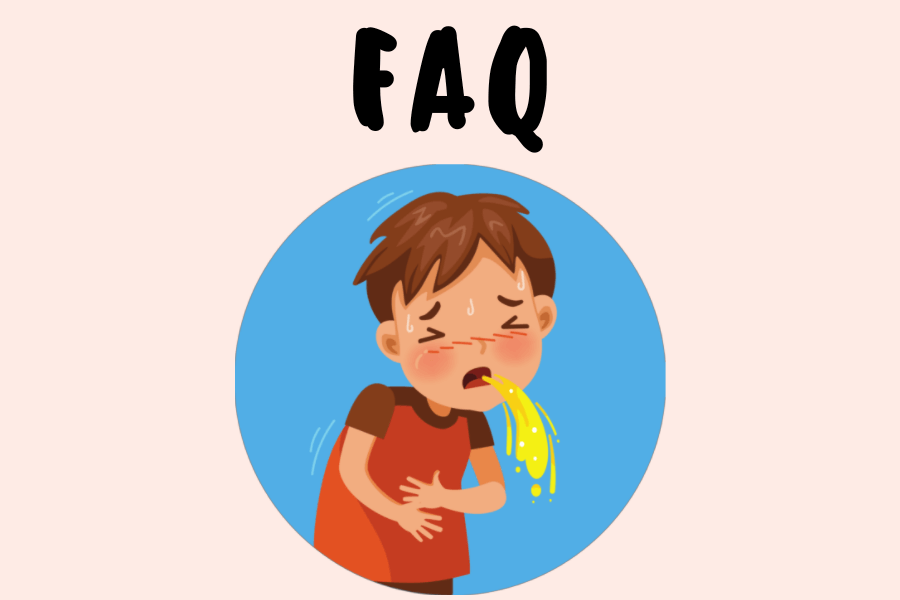
What Causes Vomiting at Night Only?
Your child’s nighttime vomiting may seem mysterious, but it could be the result of food poisoning or gastroenteritis. It’s also possible that an underlying medical condition, such as a food allergy or intolerance might be causing your little one to feel unwell. If you’re worried about what’s behind their heaving episodes at night, call your doctor!
Why Does My Toddler Keep Waking Up Throwing Up?
Is your child having bouts of vomiting and diarrhea throughout the night? It could be gastroenteritis, more commonly known as the stomach flu or tummy bug. This uncomfortable combination can result in dehydration – but don’t worry! A pharmacist will have helpful advice on how to combat this pesky problem through an oral rehydration solution.
What to Do After a Toddler Throws Up at Night?
A nighttime surprise – your toddler has thrown up! No need to panic, there are steps you can take to ensure your little one feels better soon. Encourage them to take sips of a rehydration solution every 15 minutes or try alternatives like clear broth and ginger ale if needed. It won’t be long before they’re feeling back in the swing of things again.
Should I Let My Toddler Sleep After Vomiting?
Yes, absolutely! If your toddler has recently vomited, let them get some rest. Be sure to place a towel or plastic bag nearby in case of further nausea and check on them periodically during the night. If they’re still feeling uneasy, offering sips of Pedialyte or ginger ale might ease their discomfort for a more comfortable sleep!
How Do I Stop My Toddler From Throwing Up?
Is your toddler struggling with an upset stomach? Help settle it by having them suck on ice cubes or a refreshing popsicle. After the initial nausea has passed, take them outdoors to breathe in some fresh air, and when they start feeling better, let them sip small amounts of fluid often.
Should I Give My Child Tylenol If Vomiting?
Only use Tylenol if your child has a fever or pain in addition to vomiting. It won’t help with the nausea, but it shouldn’t cause your child to get worse either.
Similar Posts:





